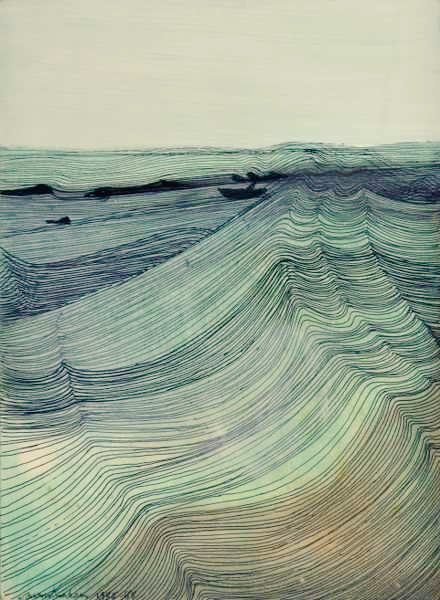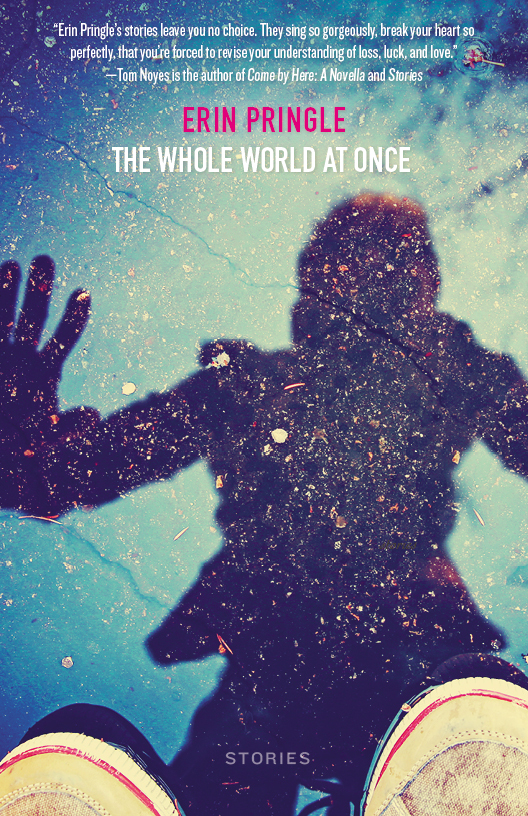My mother flew from Illinois to Washington this week to be present at the book release party for my new collection of stories, The Whole World at Once. It is a long tradition in our family to exchange clippings from the newspaper. I remember my grandmother enclosing pieces of the Evansville, Indiana newspaper in her Tuesday letters to my mother, often cut with her pinking shears that she kept in the mug on the table-lamp by her recliner. And, in my hometown newspaper, The Casey Reporter, many of my memories are also recorded in grainy black-and-white newsprint. That time I tie-dyed T-shirts in a picnic shelter as part of Art in the Park. There I am, glowing up at the camera with the face I used for posing.
I have a complicated relationship with the newspaper, since much of a rural newspaper is the fact of people's stories ending in the obituary section. Everyone you know will be in it, eventually. And so will you. One time I typed obituaries for the newspaper when my friend Ashley was working there. That is another story. Or not.
So, it wasn't a surprise when my mother arrived in my living room bearing copies of the hometown newspaper in full, in sections, or as stories clipped and folded. Not with pinking shears, though, because she doesn't sew like my grandmother did. My sister sewed like my grandmother. And taught herself how to garden like my grandmother. They both had beautiful gardens.
But the surprise was not that my mother brought the newspaper but the article she brought. It had run recently, in a sort of "On-this-day-back-in-time" collage of stories. There we are, my sister's name for a poetry award in 1987, and then me in 1997 in my show-stopping performance as Eulalie MacKecknie Shinn in The Music Man. In the articles, we're both alive. Now we're not. I am, she isn't.
If my sister were alive, or if her death weren't linked with the word suicide, how easily we would have passed over this article. All of us. Maybe my mother wouldn't have even noticed. Maybe Jennifer would have said, Cool. Maybe Mom would have written in the blank space, Send to Jennifer when you're done, and I would have dutifully forgotten or miraculously sent it back to the Midwest. Maybe other people in town who watched us grow up, sixteen years apart, and then for many years together, might have noticed our names and clipped the article and brought it to my mother at the McDonald's up by the interstate where she and other retirees visit every morning. If anyone did notice our names, so much prevents them from knowing what to do with this article. With suicide, everything becomes a clue. And then not. And then. And then. I don't know what to do with this article.
Neither did my mother. Which is probably why she cut it out, carried it 2,000 miles through the sky, and handed it to me the day before what would have been my sister's birthday. Or is still her birthday. My sister loved a good birthday.
Probably it's nothing. It's just one of those things. You know.
Today, I walked into the coffee shop where I write, having seen my mother off at the airport less than an hour earlier and after a week's visit. My barista friends and one of my coffee shop friends were smiling.
You're in the newspaper, they said.
Which shouldn't have been a surprise since I'd done the interview a few days ago, cross-legged in my car outside the same coffee shop so that I could hear the reporter on my phone. I have a new book, The Whole World at Once. It's dedicated to my sister. I'm reading from the book tomorrow downtown. My point is that all of this should have prevented surprise that I'm in the newspaper.
But on my drive to the coffee shop, I'd encountered a mother duck crossing a busy street, her ducklings following behind her. How beautiful, I thought, that all the cars are stopping once I knew why. How good. This is a good moment, I thought.
And I pulled over to take pictures, parking in the car wash, glad not to be in the way, exactly as my father would have done. My father gone, too. My father who took me across country roads, chasing twilight and beautiful angles. So that's where I was in my mind. With these ducks but with my father, too. Trying to position the camera as I've been taught. To capture the ducks as they are but also in a way that they would last, so that I could show my partner who loves animals, and then my son who doesn't yet know that ducks cross roads or that people will stop their lives to protect others'. What a nice way to start my day, I thought.
You're in the newspaper, they said as I walked into my coffee shop.
You see now why I was surprised.
I'm supposed to share with you the Spokesman Review story. And I want to. I said all of it thinking you would read it, thinking of you before you knew of me. Like Whitman. Kind, gentle Walt Whitman.
But, it doesn't seem right or real, not to share this other story, too. Not that it's story. It's just a layering of time sifted into a morning. I guess. Grief and ducklings all of a morning, I guess. Here, friend.
I have a complicated relationship with the newspaper, since much of a rural newspaper is the fact of people's stories ending in the obituary section. Everyone you know will be in it, eventually. And so will you. One time I typed obituaries for the newspaper when my friend Ashley was working there. That is another story. Or not.
 |
| My mother highlighted our names. |
But the surprise was not that my mother brought the newspaper but the article she brought. It had run recently, in a sort of "On-this-day-back-in-time" collage of stories. There we are, my sister's name for a poetry award in 1987, and then me in 1997 in my show-stopping performance as Eulalie MacKecknie Shinn in The Music Man. In the articles, we're both alive. Now we're not. I am, she isn't.
If my sister were alive, or if her death weren't linked with the word suicide, how easily we would have passed over this article. All of us. Maybe my mother wouldn't have even noticed. Maybe Jennifer would have said, Cool. Maybe Mom would have written in the blank space, Send to Jennifer when you're done, and I would have dutifully forgotten or miraculously sent it back to the Midwest. Maybe other people in town who watched us grow up, sixteen years apart, and then for many years together, might have noticed our names and clipped the article and brought it to my mother at the McDonald's up by the interstate where she and other retirees visit every morning. If anyone did notice our names, so much prevents them from knowing what to do with this article. With suicide, everything becomes a clue. And then not. And then. And then. I don't know what to do with this article.
Neither did my mother. Which is probably why she cut it out, carried it 2,000 miles through the sky, and handed it to me the day before what would have been my sister's birthday. Or is still her birthday. My sister loved a good birthday.
Probably it's nothing. It's just one of those things. You know.
Today, I walked into the coffee shop where I write, having seen my mother off at the airport less than an hour earlier and after a week's visit. My barista friends and one of my coffee shop friends were smiling.
You're in the newspaper, they said.
Which shouldn't have been a surprise since I'd done the interview a few days ago, cross-legged in my car outside the same coffee shop so that I could hear the reporter on my phone. I have a new book, The Whole World at Once. It's dedicated to my sister. I'm reading from the book tomorrow downtown. My point is that all of this should have prevented surprise that I'm in the newspaper.
But on my drive to the coffee shop, I'd encountered a mother duck crossing a busy street, her ducklings following behind her. How beautiful, I thought, that all the cars are stopping once I knew why. How good. This is a good moment, I thought.
And I pulled over to take pictures, parking in the car wash, glad not to be in the way, exactly as my father would have done. My father gone, too. My father who took me across country roads, chasing twilight and beautiful angles. So that's where I was in my mind. With these ducks but with my father, too. Trying to position the camera as I've been taught. To capture the ducks as they are but also in a way that they would last, so that I could show my partner who loves animals, and then my son who doesn't yet know that ducks cross roads or that people will stop their lives to protect others'. What a nice way to start my day, I thought.
 |
| Mama duck leads her ducklings past the car wash on Monroe |
You're in the newspaper, they said as I walked into my coffee shop.
You see now why I was surprised.
I'm supposed to share with you the Spokesman Review story. And I want to. I said all of it thinking you would read it, thinking of you before you knew of me. Like Whitman. Kind, gentle Walt Whitman.
But, it doesn't seem right or real, not to share this other story, too. Not that it's story. It's just a layering of time sifted into a morning. I guess. Grief and ducklings all of a morning, I guess. Here, friend.
 |
| Link: http://www.spokesman.com/stories/2017/may/03/local-author-erin-pringle-highlights-the-beauty-aw/ |
















